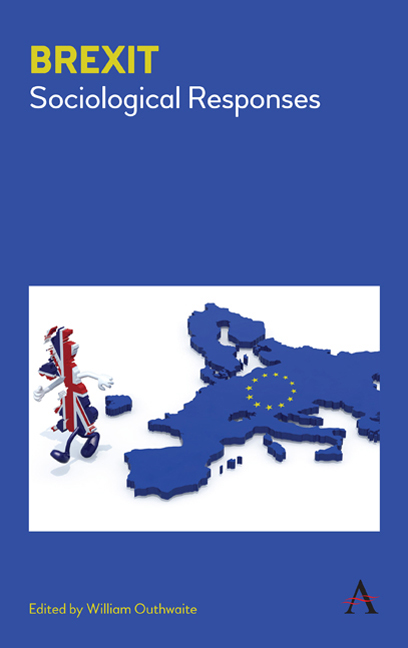Book contents
- Frontmatter
- Contents
- Preface
- Section 1 HOW DID IT HAPPEN?
- Section 2 THE POLITICS OF BREXIT
- Section 3 PROSPECTS FOR/ AFTER BREXIT
- Chapter Ten The EU and Brexit: Processes, Perspectives and Prospects
- Chapter Eleven The Impossibility of Disentangling Integration
- Chapter Twelve No Exit from Brexit?
- Chapter Thirteen Critical Theory, Brexit and the Vicissitudes of Political Economy in the Twenty- First Century
- Chapter Fourteen European Union versus European Society: Sociologists on ‘Brexit’ and the ‘Failure’ of Europeanization
- Notes on Contributors
- Index
Chapter Thirteen - Critical Theory, Brexit and the Vicissitudes of Political Economy in the Twenty- First Century
from Section 3 - PROSPECTS FOR/ AFTER BREXIT
Published online by Cambridge University Press: 10 January 2018
- Frontmatter
- Contents
- Preface
- Section 1 HOW DID IT HAPPEN?
- Section 2 THE POLITICS OF BREXIT
- Section 3 PROSPECTS FOR/ AFTER BREXIT
- Chapter Ten The EU and Brexit: Processes, Perspectives and Prospects
- Chapter Eleven The Impossibility of Disentangling Integration
- Chapter Twelve No Exit from Brexit?
- Chapter Thirteen Critical Theory, Brexit and the Vicissitudes of Political Economy in the Twenty- First Century
- Chapter Fourteen European Union versus European Society: Sociologists on ‘Brexit’ and the ‘Failure’ of Europeanization
- Notes on Contributors
- Index
Summary
Introduction
In a very short time, much has been written by social scientists, philosophers, journalists, and other well- informed commentators about the lead- up to and the outcome and aftermath of the Brexit referendum. Most of it is highly insightful and provides a public searching for explanations of what happened, and why, with probing, compelling, and sobering analyses. Brexit has been illuminated from a multiplicity of angles, at many different levels of social, political, and cultural complexity, so much so that it is easy to be overwhelmed by what may resemble a baffling cacophony of both consonant and conflicting voices and a disorienting kaleidoscope of (in)sights.
With sociology as the discipline that has been accompanying, analyzing, and reflecting on the history and transformations of modern society since the second half of the nineteenth century, the contributions of sociologists to illuminating Brexit should be especially valuable. Yet, since sociology is the most pluralistic and diverse as well as fragmented social science, sociologists may well run the risk of amplifying further the impression that the issue of Brexit simply is too complicated to penetrate in a manner that leads to discernible lessons for the future.
Presently, the event of the Brexit referendum is of interest above all for three reasons. First, what does Brexit signify, sociologically? Secondly, what contribution can (and should) sociology make to illuminating Brexit as a social phenomenon? And thirdly, what does Brexit tell us about, and mean for, sociology as a discipline? In the interest of providing preliminary answers to these questions, we first need to delineate a cursory diagnosis of what may have contributed to the outcome of the Brexit referendum, then take a step back both from the continuing turmoil caused by Brexit and today's understanding (and self- understanding) of sociology with regard to its subject matter, modern society, and return to the discipline's origins in the nineteenth and the early twentieth century.
The Sociological Significance of Brexit
From several angles, Brexit is the most visible recent instance pointing away, in an emphatic fashion, from established perspectives on the developmental trajectory of modern society as they came to be accepted during the post– World War II era.
- Type
- Chapter
- Information
- BrexitSociological Responses, pp. 183 - 192Publisher: Anthem PressPrint publication year: 2017



